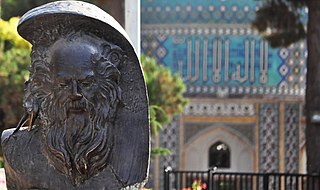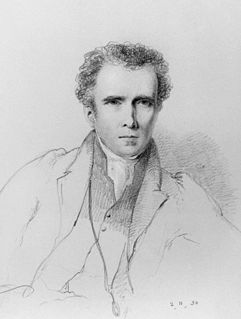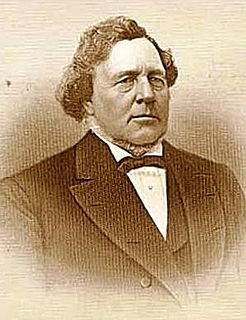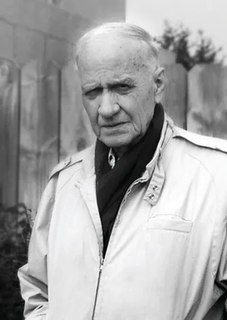A Quote by Farid al-Din Attar
A thousand for his love expired each day, And those who saw his face, in blank dismay Would rave and grieve and mourn their lives away- To die for love of that bewitching sight Was worth a hundred lives without his light. None could survive his absence patiently, None could endure this king's proximity- How strange it was that man could neither brook The presence nor the absence of his look!
Related Quotes
If he looked into her face, he would see those haunted, loving eyes. The hauntedness would irritate him - the love would move him to fury. How dare she love him? Hadn't she any sense at all? What was he supposed to do about that? Return it? How? What could his calloused hands produce to make her smile? What of his knowledge of the world and of life could be useful to her? What could his heavy arms and befuddled brain accomplish that would earn him his own respect, that would in turn allow him to accept her love?
Human life is thus only a perpetual illusion; men deceive and flatter each other. No one speaks of us in our presence as he does of us in our absence. Human society is founded on mutual deceit; few friendships would endure if each knew what his friend said of him in his absence, although he then spoke in sincerity and without passion.
When a man sought knowledge, it would not be long before it could be seen in his humbleness, his sight, upon his tongue and his hands, in his prayer, in his speech and in his disinterest (zuhd) in worldly allurements. And a man would acquire a portion of knowledge and put it into practice, and it would be better for him than the world and all it contains - if he owned it he would give it in exchange for the hereafter.
The first man . . . ventured to call food and nourishment the parts that had a little before bellowed and cried, moved and lived. How could his eyes endure the slaughter when throats were slit and hides flayed and limbs torn from limb? How could his nose endure the stench? How was it that the pollution did not turn away his taste, which made contact with the sores of others and sucked juices and serums from mortal wounds?
Non-injuring has to be attained by him who would be free. No one is more powerful than he who has attained perfect non-injuring. No one could fight, no one could quarrel, in his presence. Yes, his very presence, and nothing else, means peace, means love wherever he may be. Nobody could be angry or fight in his presence. Even the animals, ferocious animals, would be peaceful before him.
I held his gaze. I could see the storm in his eyes. I knew he was confused. I could see the fear. Then there was the love. I saw it. The fierceness in his eyes. I believed it. I could see it clearly. But it was too late now. The love wasn't enough. Everyone always said that love was enough. It wasn't. Not when your soul was shattered.
What a wee little part of a person's life are his acts and his words! His real life is led in his head, and is known to none but himself. All day long, the mill of his brain is grinding, and his thoughts, not those of other things, are his history. These are his life, and they are not written. Everyday would make a whole book of 80,000 words -- 365 books a year. Biographies are but the clothes and buttons of the man -- the biography of the man himself cannot be written.
Gargantua, at the age of four hundred four score and forty- four years begat his son Pantagruel, from his wife, named Badebec, daughter of the King of the Amaurotes in Utopia, who died in child-birth: because he was marvelously huge and so heavy that he could not come to light without suffocating his mother.
We could go back," he said. In the dome light of the car, his face looked hard as stone. "We could go back to your house. I can stay with you always. We can know each other's bodies in every way, night after night. I could love you." His nostrils flared, and he looked suddenly proud. "I could work. You would not be poor. I would help you." "Sounds like a marriage," I said, trying to lighten the atmosphere. But my voice was too shaky. "Yes," he said.
The one who confidently looks forward to an eternal reward for his efforts in mortality is constantly sustained through his deepest trials. When he is disappointed in love, he does not commit suicide. When loved ones die, he doesn’t despair; when he loses a coveted contest, he doesn’t falter; when war and destruction dissipate his future, he doesn’t sink into a depression. He lives above his world and never loses sight of the goal of his salvation.
On his deathbed he asked for a priest and became a Catholic. That was his wife's religion. It was his own business and none of mine. If you had sentenced one hundred and sixty men to death and seen around eighty of them swing, then maybe at the last minute you would feel the need for some stronger medicine than the Methodists could make.
Frank W. Woolworth once told me that the turning-point in his career did not come until he was thrown flat on his back by illness. He was sure that his business would go to pieces during his long, enforced absence. Instead, he discovered that he had in his employ men who could overcome difficulties when given power to exercise initiative. After that Woolworth left many problems and difficulties to be solved by subordinates and turned his attention to big things.







































